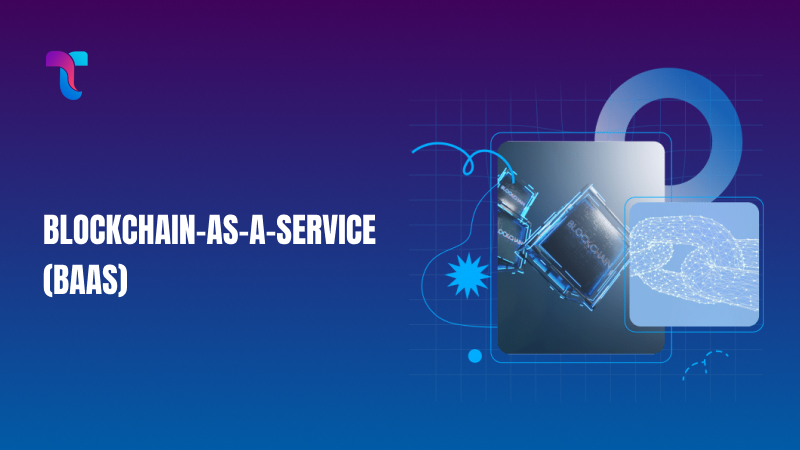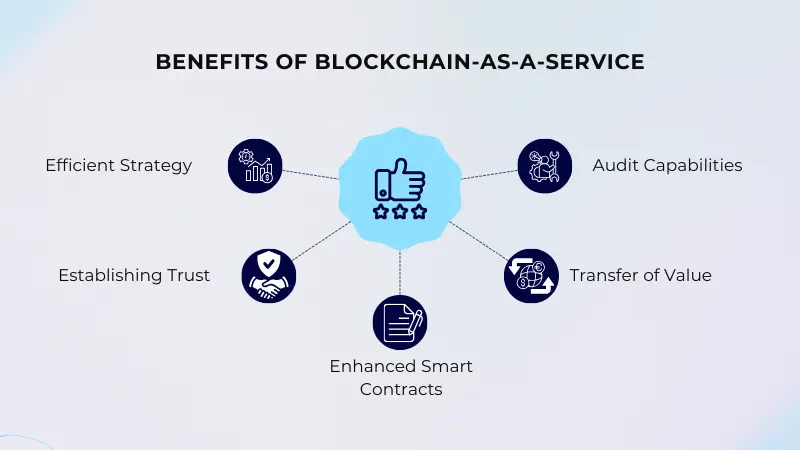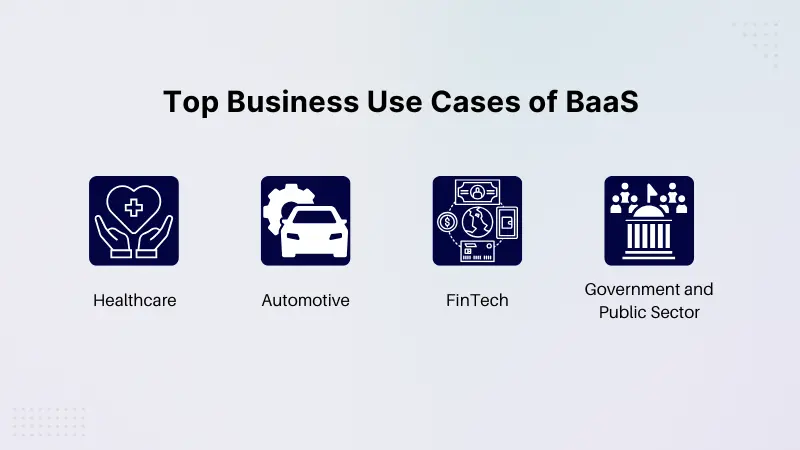Table of Contents
Blockchain-as-a-Service (BaaS) is a cloud-based model that allows businesses to build, deploy, and manage blockchain applications without handling infrastructure or network maintenance. It is ideal for organizations seeking faster adoption, lower operational complexity, and scalable blockchain solutions using managed platforms. BaaS is right for businesses that want to experiment with or implement blockchain while minimizing cost, technical overhead, and deployment risk.
When you hear the word “blockchain,” what is the first thing that comes to your mind? Generally, cryptocurrency like Bitcoin or Ethereum? Indeed, most individuals have this same problem. However, the truth is that blockchain technology is beyond digital currencies, and businesses of all sizes are starting to adopt it.
The question arises: Why are businesses attracted to it? Do you have any ideas? It’s all because of Blockchain-as-a-Service. It is a cloud-based solution that lets companies tap into the power of blockchain without building and maintaining the complex infrastructure themselves.
From improving the supply chain transparency to enhancing the data security and workflows with smart contracts, BaaS ensures businesses with impressive innovation across industries. But the question remains: Is Blockchain-as-a-Service right for your business?
So, to get your answer, all you’re required to do is scroll through this comprehensive guide till the end. Let’s begin!
What is Blockchain-as-a-Service?
Discussing the term “BaaS,” it is the next level of technology that is helping businesses to develop rapidly and smoothly.
It typically works as a third-party provider that enables companies to create and manage their cloud-based networks for developing blockchain applications. As a result, businesses are getting the advantage of scalable and enterprise-grade blockchain infrastructure in cloud environments.
In addition to this, BaaS further enables companies to access their blockchain provider’s service and develop blockchain applications at a lower cost. This results in well-maintained infrastructure, agile environments, and flexible and scalable blockchain development.
How Does BaaS Work?
Coming to how Blockchain-as-a-Service works, before that, let’s have a look at its development.
In the year 2023, the global Blockchain-as-a-Service market was valued at $2.49 billion, which has potentially grown to $2.84 billion in 2024. Whereas, talking about its future assumptions, by 2032, this market is anticipated to develop by $23.89 billion, with a CAGR of 30.5%.
With the mind-blowing growth, the industry is surely going to capture a wider sector of businesses. So, to simplify your emerging process and ensure your business remains competitive in this fast-paced world, all you require is the help of a blockchain development company.
Here is how you can take advantage of BaaS
Talking about its working process, BaaS typically works like a cloud-based hosting model, where a third-party provider is able to set up and handle the blockchain infrastructure seamlessly. Instead of building and maintaining blockchain networks, it promotes businesses to access blockchain features through the cloud. Let’s understand it with simple steps:
- First BaaS providers set up blockchain networks on cloud servers. This process typically involves nodes, consensus mechanisms, storage systems, and APIs. With the help of this, businesses wouldn’t be required to purchase expensive hardware or configure blockchain frameworks.
- Once the set is done, the next step is typically to proceed with network management. Here, the providers continuously manage the blockchain environment, ensuring high uptime and smooth operation of blockchain-based applications with modules like node monitoring, fault tolerance, and disaster recovery.
- Next, it works on security & compliance. Discussing this, every blockchain network should ensure a secure channel against hacking, double-spending, or DDoS attacks. Further, BaaS providers generally manage encryption, identity management, key storage, and compliance with industry standards.
- Once it’s done with all the security measures, it now requires implementing smart contracts & dApp development. Here, the providers typically offer various development tools, SDKs, and templates, aiming to ensure companies focus on their business logic and innovation.
- As it’s done with all the security protocols, it typically integrates with existing systems. Here, APIs and pre-built connectors allow blockchain features to integrate seamlessly and facilitate blockchain adoption among industries like finance, healthcare, real estate, and others.
- Since the application is done with its security measures, now it’s time to check for scalability and performance. Now, as transactions continue to rise, the BaaS providers automatically scale up the infrastructure. Businesses would not need to be concerned about adding more nodes or storage, and this makes BaaS appropriate for startups and large enterprises.
Once it is done with all the measures, then users will benefit from ongoing support and updates. Herein, the providers ensure ongoing upgrades, bug fixes, and improvements. While technical support teams help businesses with deployment issues, troubleshooting, and optimization.
Benefits of Blockchain-as-a-Service for Businesses
With the help of this cloud-based model, here are the top benefits businesses are going to gain from it:
Efficient Strategy:
Among all the benefits, the primary benefit BaaS offers is effective strategy development. This is a next-level advantage where businesses are getting opportunities for cost savings, faster markets, and simplified implementation. It further enables businesses to reduce upfront capital investment and offers them subscription models or pay-as-you-go options.
Establishing Trust:
In BaaS-based platforms, users are taking advantage of diverse and increasingly sophisticated consensus algorithms. In this, proof-of-work generally needs miners to compete in solving complicated mathematical puzzles. On the other hand, PoS depends on validators who stake cryptocurrency to confirm transactions. Meanwhile, PoW is energy-intensive, whereas proof of stake and newer consensus models are more energy-efficient.
Enhanced Smart Contracts:
These are the self-executing contracts that are stored on the blockchain networks. They generally operate with the help of the Ethereum Virtual Machine or a similar execution environment. In contrast, these contrasts execute predefined functions, making them trustworthy and deterministic options. However, BaaS platforms continue to sustain the development of customized smart contracts by utilizing programming languages like Solidity or Vyper.
Transfer of Value:
BaaS platforms usually support cryptocurrencies, where each one of them has its unique identity and underlying technology. So, using cryptocurrencies in applications requires keys, APIs, and protocols. Additionally, the participation of tokenization secures the adequate creation, transfer, and management of tokens carefully.
Audit Capabilities:
By recording all blockchain interactions in a structured format, BaaS providers commonly offer comprehensive audit trail capabilities. This enables users to have detailed logs and event records, allowing them to analyze their transaction history with a sequence of actions. Moreover, the blockchain’s transparency stems from its public ledger, where all transactions are significantly visible.
Potential Challenges of BaaS
Blockchain as a Service (BaaS) can address nearly all issues related to blockchain technology. However, every valuable model has its limitations, including several major challenges typically encountered with BaaS:
Return to Centralization:
One of the strongest reasons businesses adopt blockchain is its decentralized nature. However, with BaaS, there is an inherent shift back toward centralization. Since your transactions and operations run through the service provider’s infrastructure, you become dependent on their systems and oversight.
Scalability Issues:
Generally, BaaS service providers present tiered services, letting users pay for what they operate. While this can help save costs, it can also limit scalability, especially if usage rises drastically or an organization has more needs not protected by the blockchain network’s scope.
Lack of Knowledge and Expertise:
While BaaS reduces the need to build a blockchain ecosystem from scratch, it still requires skilled professionals to manage, troubleshoot, and oversee the platform. Without proper expertise, businesses may struggle to use BaaS effectively.
Cost:
BaaS lowers initial expenses by removing the need for building infrastructure. However, as usage grows, subscription and service fees can add up quickly, making it costly for businesses with high demands.
Is BaaS Right for Your Business? Key Considerations
After learning so much about BaaS, there is still a question in your mind: whether it is right for your business? So, if this is the case, then the decision is totally dependent on your company’s goals, resources, and industry needs. Let’s simplify it:
Industry Needs:
Understand the benefits your company can gain from blockchain. For example, finance and supply chain require transparency and traceability, the healthcare sector needs secure data sharing, and so on.
So, considering it, if your sector relies on trust, security, or multi-party collaboration, then BaaS could be positively valuable.
Existing IT Infrastructure:
BaaS works best when it is integrated with your systems. If your IT infrastructure is outdated or lacks cloud compatibility, then adopting BaaS can be a game-changing solution.
Budget and Cost Management:
Comparatively, BaaS reduces upfront infrastructure costs, making it suitable for startups and SMEs. However, subscription and usage fees can scale quickly, so you must weigh long-term costs vs. ROI to avoid overspending.
Scalability Goals
If your business expects to address large transaction volumes, ensure your BaaS provider sustains scalable solutions. Some platforms may be ideal for head projects but not suitable for enterprise-level demands.
Regulatory and Compliance Requirements:
Industries like finance, healthcare, and government typically face strict compliance standards, so here, choosing a BaaS provider can make your compliance robust and inform your understanding of your industry’s regulations.
Top Business Use Cases of BaaS
The use cases for Blockchain as a Service are vast and limitless; among them, some of the top ones include:
Healthcare:
With the universal and transparent version of patient medical data, blockchain technology has significantly altered the healthcare industry. By using this technology, the healthcare industry is taking advantage of well-organized and updated data, which can simply be used to verify the legitimacy of pharmaceuticals.
Automotive:
One of the greatest problems the automotive industry faces is handling supply chains and avoiding fake components. So, with the help of the blockchain platform, they’re able to gain end-to-end accessible records for transporting automotive parts, which helps enterprises to track and differentiate genuine spares from fakes.
FinTech:
Thanks to blockchain technology, earlier, where consumers were facing problems with their KYC and AML compliance, now they’re easily able to simplify them. By using this technology, the FinTech industry has gained significant growth while enhancing transparency and immutability to avert conflicts. Through this, users are also getting the benefits of quicker financial payments, without requiring any role of intermediaries.
Government and Public Sector:
Blockchain’s transparency and permanent nature have the ability to transform government processes. By enabling secure identity management, transparent voting systems, and efficient public records handling, blockchain is changing how governments deliver public services and build trust with citizens.
Conclusion
Through this comprehensive guide, we have discussed in-depth information related to BaaS.
The Blockchain-as-a-Service typically empowers businesses to leverage blockchain’s potential without the burden of creating complex infrastructure. Furthermore, if you’re worried about the challenges like centralization, costs, and scalability that exist, then also look for the benefits, which will be enhanced transparency, security, and efficiency.
Lastly, it’s up to you whether you’re likely to utilize this advanced level of technology for your business or not. Also, to simplify your development process and ensure a future-ready, scalable, and cost-effective journey, all you’re required to do is choose Technoloader as your partner.
 +91 7014607737
+91 7014607737
 info@technoloader.com
info@technoloader.com





